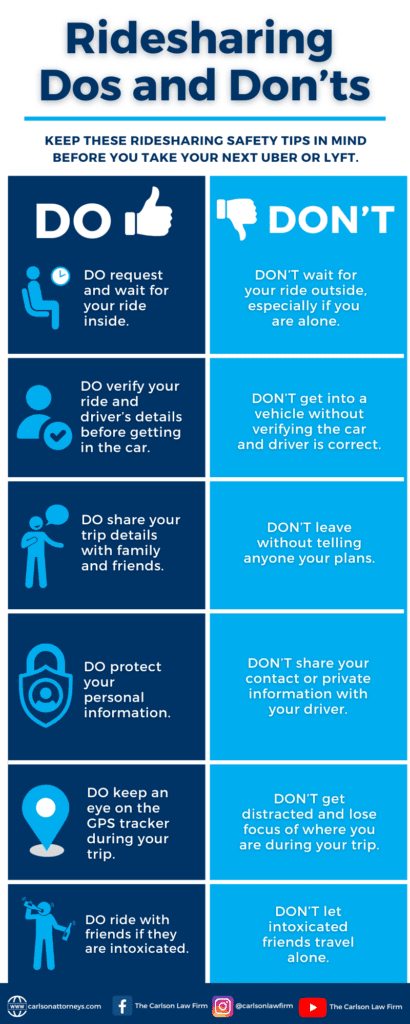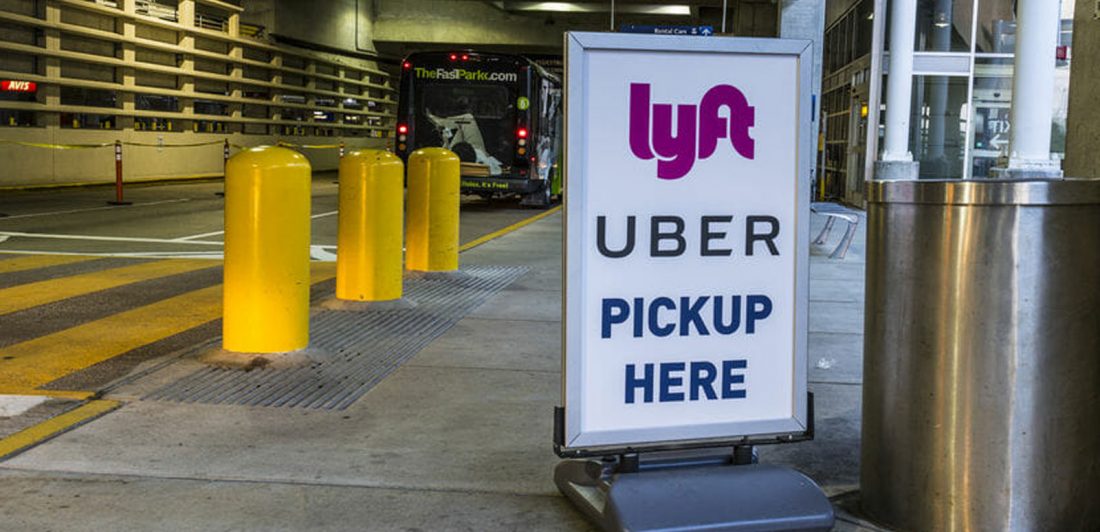Ridesharing services like Uber and Lyft have become a staple part of our vacations, a night on the town and, for some, getting to and from work. These services have completely changed how transportation works in cities. Ridesharing services allow users to hail a ride through an app, an added convenience for passengers in need of transportation. However, these services also present dangers for both riders and drivers. Passengers risk everything from car crashes and assaults to identity theft and rape.
No matter how much you trust the services provided, it’s always possible to be a victim of a terrible situation. While people should always be held responsible for their own bad actions, it’s equally important that we remain vigilant in protecting ourselves and our loved ones.
What Is Ridesharing?
The basic concept of ridesharing is using an online platform, typically through an app on a smartphone, to connect with on-demand drivers. Rideshare drivers use their privately-owned vehicles to facilitate transportation needs. Drivers set their schedules and can work as little or as much as they want.
The entire transaction is done through the app so that no cash is exchanged. When signing up for the app, riders have to put their credit or debit card information into the app. The app automatically deducts the cost of the ride from the rider’s card. Further, at the end of the trip, the app allows the rider to tip.
Problems Plaguing Uber and Lyft
Ridesharing services have received plenty of criticism, including everything from decreasing the pay of its drivers to increased traffic fatalities. More troubling, though, are the 1,600 pending lawsuits against Uber and Lyft which claim that the companies “failed to implement appropriate safety precautions to protect passengers, and that plaintiffs suffered sexual assault or harassment as a result.”
Unfortunately, with ridesharing services there is a serious risk of getting into a car with a predator or picking up a passenger with predatory intentions. Every day, we see headlines about the dangers that both passengers and drivers face, as over the years there have been reports of drivers and passengers being attacked, raped, or robbed.
Do Ridesharing Services Do Background Checks?
Most, if not all, ridesharing services conduct background checks on their drivers. However the extent of the background checks often depends on the state in which they are operating. To operate in Texas, ride-hailing services must comply with the following to conduct business in the state:
- Obtain a permit from the Texas Department of Licensing and Regulation
- Conduct annual local, state, and national criminal background checks on drivers upon their hire and again annually.
- Perform annual sex offender checks on all drivers.
- Maintain a policy prohibiting any amount of intoxication for drivers logged into the company system and give passengers the ability to report drivers they suspect to be in violation of this policy.
What Is Uber’s Background Check Policy?
Uber partners with third-party background check providers like Checkr, HireRight, and Samba Safety to conduct background checks. The background check includes a motor vehicle report which checks that the driver has a valid U.S. drivers license and that the driver has the minimum amount of driving experience required. Uber’s background check also ensures that applicants are the minimum age, which varies by state. Lastly, the background check includes the applicant’s criminal history, disqualifying those with certain criminal convictions and pending charges.
What Is Lyft’s Background Check Policy?
Lyft uses a third-party company to conduct a criminal background check, which searches national and county-level databases and courthouse records for adult convictions. Lyft reviews the results and assesses against applicable regulations. According to its website, if the following are uncovered in your background check, the company may bar you from driving for it:
- Presence on the National Sex Offender Registry database
- Convicted of a violent crime such as homicide, kidnapping, human trafficking, arson, burglary, carjacking, robbery, or aggravated assault
- Convicted of a sexual offense (rape, sexual assault, child pornography)
- DUI convictions
- Drug convictions
- Fraud convictions
- Convicted of theft or property damage
The company’s website also says that different jurisdictions may have laws that require it to have more stringent ineligibility requirements.
Driver’s License Requirements
Rideshare drivers don’t have the same license requirements as taxi drivers. For example, ridesharing services like Uber and Lyft only require their drivers to carry a standard vehicle operator’s license. On the other hand, taxi drivers are required to carry commercial licenses.
How Can I Stay Safe During My Rideshare?

Whether you’re putting a friend in a car after a night out or using a ride-hailing service from the airport, staying safe in all situations means using common sense. Follow these tips to help keep you and your loved ones safe during your rideshare.
1. Plan Ahead.
If you know that you are going to need a rideshare, be sure to familiarize yourself with the app and the company’s policies. Many ridesharing service apps have safety features built into them.
2. Request and Wait for Your Ride Inside.
You never know who is watching. That is why you should minimize the time that you’re standing outside alone or distracted by the phone in your hand. For your safety, it’s best to wait inside until the app shows that your driver has arrived.
3. Double-Check Your Ride.
Ridesharing apps display details about your driver and their vehicle such as the driver’s name, the car make, model, color, and even the license plate number. If the vehicle or driver doesn’t match the information displayed in your app, do not get in the car.
4. Ask the Driver to Confirm Your Name.
The best way to know you’re getting into the vehicle of the correct driver is by asking them to verify your name before you get in the car. Your driver will see your first name in the app, and your driver’s name should also be displayed on your end. To safely exchange names, you can ask, “who are you here to pick up?”
Because ridesharing drivers have also been victims of attacks, your driver may also seek peace of mind by asking you to confirm their name.
5. Sit in the Backseat.
Sitting in the backseat is safer than sitting in the front for two reasons. The first reason is that it allows you to exit the vehicle on either side of the car should you need to do so. The second reason is that it provides a barrier of space between you and the driver.
6. Wear Your Seatbelt.
Many people believe they don’t need to wear their seatbelts in the backseat. However, even with the best, most defensive driver behind the wheel, he or she can’t control other drivers on the road and prevent all car crashes. With that in mind, always wear your seatbelt.
7. Use the Share Route Option.
Once you’re in your ride, many apps have the option to share your trip and details like the driver’s name, photo, license plate, and location with a friend or family member. Once you’ve shared your trip status, your loved one will receive a text or push notification that tracks your trip and ETA.
8. Actively Protect Your Personal Information.
There’s no reason that your ridesharing driver will ever need your contact information. In fact, both Uber and Lyft anonymize phone numbers in case the driver or rider need to call one another.
9. Keep an Eye on Your GPS Tracker.
Many of us have a tendency to get in the Uber or Lyft and either put our phones away or close out the app and head over to our social media website of choice. However, it’s wise to keep an eye on the GPS tracker to ensure your driver is taking you to the proper destination.
10. Don’t Let Intoxicated Friends Travel Alone.
Ridesharing is a great option for those who want to go out and drink alcohol. However, riding alone can present certain dangers for intoxicated solo riders. There are reports of drivers perpetrating rapes against riders who were alone. It’s best to ride along with those who aren’t sober to make sure they reach their destination safely.
Protect Yourself with The Carlson Law Firm
As ridesharing services become more entrenched in our society, these services carry certain risks. Anything from auto accidents to assaults can occur during or after an Uber or Lyft ride. If you suffered any injuries while using a ridesharing service, you might be entitled to compensation for the medical bills, pain, suffering, and even future medical procedures. At The Carlson Law Firm, we can help you prove who is at fault for your injuries. Our skilled team of attorneys will thoroughly investigate your situation and build a case that gets you the best recovery possible.
Contact us as soon as possible for your free consultation. We care. We can help.





